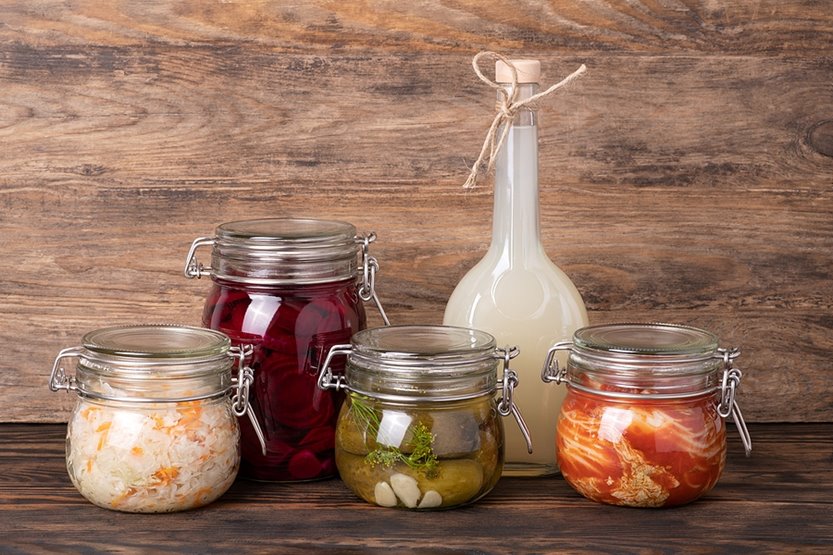
Fermented foods are thought to have health benefits and be good for your gut. They have been eaten around the world for many centuries. Read on to find out how fermented foods are made, examples of fermented foods, and if there are any benefits to including them in your diet.
What are fermented foods?
Fermented foods are produced when good bacteria that has been added or is found naturally occurring in the food creates acid to help preserve it. Fermentation has been used for thousands of years as a way to preserve food. Since some fermented foods, like yogurt, also contain good sources of live bacteria they can also be a source of probiotics.
What are some examples of fermented foods?
There are many types of fermented foods to choose from. Examples include:
-
Kombucha – is a fermented drink traditionally made from black or green tea. Some brands have added sugar, so make sure to compare the labels.
-
Kefir – is a fermented milk drink containing live probiotics. It has a naturally tart taste but you can also get it in many flavours, just make sure to check the label for added sugars.
-
Kimchi – is a spicy fermented vegetable dish, often eaten in Korea.
-
Yogurt – is made from adding good bacterial cultures to milk. Yogurt is a good source of probiotics. Check the label for added sugar.
-
Sauerkraut – is a fermented cabbage dish eaten in many parts of Europe.
-
Miso – is a fermented soybean paste used in Japan to flavour food, like miso soup.
-
Tempeh – is made from fermented soybeans and has a firmer texture than tofu. It is used in many vegetarian dishes as a source of protein.
-
Sourdough bread – is a type of bread made from fermented flour.
Are fermented foods good for you?
Fermented foods may contain probiotics. Learn more about probiotics and possible health benefits here. Not all fermented foods contain probiotics though, so make sure to read the label to find out if it contains probiotics and how it is made.
The fermentation process may also lead to increased vitamins and minerals and create biologically active compounds which may have health benefits. However, more research is needed to say for sure whether fermented foods have health benefits and how much you need to eat or drink to get the benefits.
How much fermented foods should I eat?
There is no recommendation for how much fermented foods to eat or drink each day. Fermented foods can be enjoyed as part of a balanced diet and by following Canada’s Food Guide. When choosing fermented foods, read labels to look for ones with less added sugar and sodium (salt).
Are there any safety concerns for fermented foods?
Fermented beverages like kombucha, may contain very low levels of alcohol. Alcohol levels can vary depending on the fermentation process, the storage conditions and how long the food has been stored.
When it comes to Kombucha tea, it is recommended that people who are immunocompromised, women who are pregnant and breastfeeding, and children should avoid this beverage, especially if home brewed. Homemade kombucha may be unsafe to drink depending on how it is made.
How can a dietitian help?
A dietitian can help you choose fermented foods with high levels of probiotics, less added sugar and less sodium (salt). Dietitians can support you throughout many phases of your life from pregnancy to eating well when you are older. They can also help you with label reading and planning a balanced diet. Your dietitian will work with you to give you personalized advice that meets your lifestyle and goals. Connect with a dietitian today!
Bottom line
There is no specific recommendation on how much fermented foods to eat every day. Fermented foods can be included as part of a balanced diet. When choosing fermented foods, compare labels and look for ones low in added sugar and sodium (salt).
You may also be interested in:
What is the Low FODMAP Diet?
What Are the Benefits of Probiotics?
How Can I Find a Dietitian Near Me?
This article was written and reviewed by dietitians from Dietitians of Canada. The advice in this article is intended as general information and should not replace advice given by your dietitian or healthcare provider.
Last Update – February 18, 2023